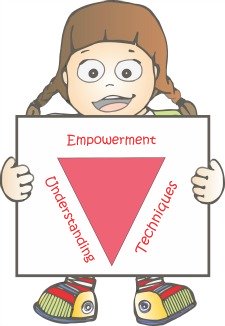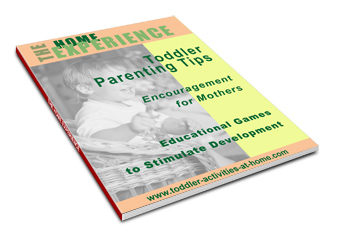The Toddler Behaviour Helper
Raising a child is the most important job in the world. It's something that we're desperate to do right - so why does it seem so difficult?
The defiance.
The unreasonable demands.
The endless Screamathons that repeat themselves on a loop, no matter how many treats you give your toddler - or how many times you put them in Time Out.
Are you sick of banging your head against a brick wall? Of shouting at your toddler, then feeling guilty - but not knowing what to do about it?
The first thing I want to tell you is:
It's Not Your Fault
Here's Why
Toddlers don't think like the rest of us.
Most seven-year-olds are able to be quiet for just 5 minutes if you explain why you need to make that really urgent call. But toddlers? Forget it.
Here's the thing: between the ages of one and four, children go through an intense period of change. Learning to speak, potty training, physical coordination and social skills all require a huge effort.
Mother Nature's Helping Hand
Toddler Behaviour Helper says that Mother nature has helpfully equipped the toddler brain with
some really powerful tools to help them get through this period. I’m talking
about perseverance, motivation and curiosity - to name but three. Walking,
talking and toilet training would be impossible without that extra help.
There's just one problem with this.
At such a young age, they just don't know how to channel these skills. Because they are so socially inexperienced, they start overusing them.
For example, the amazing perseverance required to master walking is also used to climb onto your kitchen units and start grabbing everything in sight! (You haven’t lived til you’ve discovered your 3-year-old drinking soy sauce on the kitchen floor).
Super Toddler Strikes Again
(and Again)
Your toddler is like a trainee superhero: SuperToddler.
On Monday SuperToddler saves the city by lifting the phone box that contains the bomb and throwing it into the sea, out of harm’s way.
On Tuesday, instead of letting the people get back to normal and rebuild the city, SuperToddler just can't stop themselves uprooting all the rest of the phone boxes in the area.
Traditional discipline matters such as spanking & Time Out are destined to fail, because they don’t take “SuperToddler” psychology into account.
No wonder you've hit a wall. No wonder that - despite your best efforts - you just can't seem to get through to your toddler, and teach them how to behave.
Toddler Behaviour Helper
So What's The Answer?
The solution to the fix you find yourself in comes down to
making a choice. Let me warn you now that for some people it's not a
particularly easy choice to make - however, the right decision now will save you
a lot of stress and heartache in years to come.
Toddler Behaviour Helper Choice A
Do nothing. Carry on as you are now, struggling to cope with your child's tantrums and antisocial behaviour. Deal with the frustration of not being the parent you know you can be.
As your child gets older, things will probably get easier -but you may find that you are reliant on discipline methods that you know don't really work such as shouting and bribery.
In a few years time, your child will start mimicking your emotional reactions - this can be unpleasant, but at least you can have a good old moan about them to your friends.
Toddler Behaviour Helper Choice B
Commit to really understanding why toddlers behave as they do, and learn some proven techniques for getting them to behave through persuasion rather than force.
Start opening your mind to the possibility that you can start to be a calmer and more confident parent right now - that it needn't take months and months :)
Realise that the changes you make now – while your child is still young - will pay off tenfold in your next decade and a half of parenting.
Ready to dive in and make choice B? It all comes down to...
The Toddler Triangle

The Toddler Triangle is a system for improving your toddler's behaviour. It has three parts:
Understanding
- before you can tackle any problem behaviour, you need to understand
what makes toddlers tick, and why they behave - and misbehave - as they
do.
Techniques - you then need some proven techniques for both preventing and dealing with undesirable behaviour.
Empowerment
- understanding and techniques are very helpful, but there will be
times when there is nothing you can do to get your child on side. This
is why it it's vital to have some practical ways to deal with the stress
of parenting this age group.
If you can deal with your own
reactions, you will be less affected by the ups and downs of your
child’s emotions. Your calmness will then rub off on to them, which in
itself will reduce tantrums and so on.
To Help Busy Mums and Dads Here Are Some Related Shopping Items
When you purchase from this link, you are actually purchasing from Amazon.com, and you can have peace of mind that your order will be processed by Amazon’s secure order server.
Other Articles for You
Home l Stay At Home Moms l Toddlers Games l Toddler Exercise l Constipation in Toddlers l Shopping with Toddlers l Helping Toddlers Overcome Fears l Teaching Toddlers Manners l Toddler Music Activities l Homeschooling Toddlers l Toddler Bedroom l Toddlers And Food l Parenting Toddlers Alone l Reading to Toddlers l Aggressive Toddler l Toddler Sleep Tips l Buying toddler toys l Shy toddler l Development l Toddler Chores l Toddler Routines l Toddler Educational Activities l Toddler Learning Activities l Toddler Coloring Pages l










New! Comments
Have your say about what you just read! Leave me a comment in the box below.